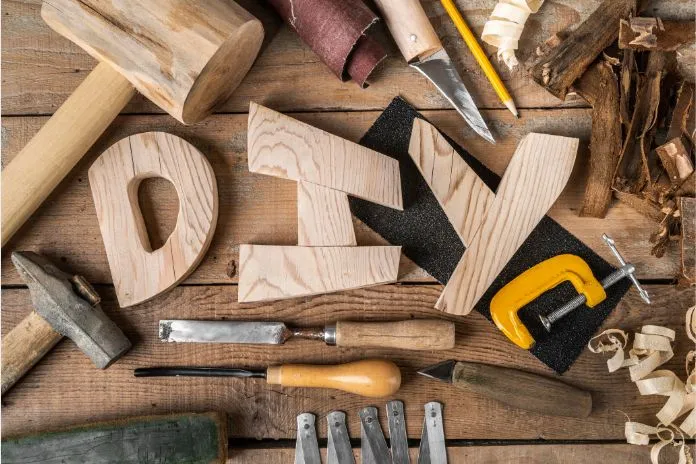
Possessing the necessary tools is integral to successfully completing DIY projects with professional-looking results and confidence. A well-stocked toolbox should contain basic hand tools like hammers, screwdrivers of various sizes and tape measures – which should form the core of a toolbox.
As well as your basic tools, you should also have pliers for gripping and bending wires and a utility knife for cutting materials. A stud finder allows for precise shelf and cabinet hanging.
1. Hammer
A hammer is one of the fundamental tools any DIY enthusiast should possess, with models featuring both claws for pulling nails and flat heads to facilitate general pounding tasks. When selecting one for purchase, be sure to find one with both features available – claw for pulling nails and flat for general pounding tasks.
Stud finders are an easy and simple tool that will make hanging items on walls much simpler. By helping locate the studs behind walls, this device prevents damage or injury caused by hanging items incorrectly.
2. Screwdrivers
Be it fixing a toy or hanging a picture frame, having the appropriate tools can make all the difference in the world. Here are 10 essential household tools that will help get any task completed successfully and efficiently.
Screwdrivers are essential components of any DIY toolbox. A comprehensive set should include both flathead and Phillips screwdrivers in different sizes – and magnetic tips will save time by helping keep screws from wandering into hard-to-reach places.
3. Tape Measure
A tape measure is one of the essential tools for any DIY enthusiast, enabling them to read measurements accurately and transfer them onto their workpiece. Accurate measurements are crucial in any project and can save both time and money in the long run.
Komelon tape measures are specially-made to meet the demands of professional tradespeople and home DIYers, boasting shock-absorbent cases and sturdy steel blades that won’t collapse under use. Furthermore, there is a fast retraction mechanism with positive locking that won’t twist in the middle during use.
4. Utility Knife
Utility knives are essential tools for cutting and trimming building materials like drywall, carpet and shingles. Most feature retractable blades that can be locked when not in use.
This versatile tool comes in handy when removing price stickers from items in stores or cooking ingredients for caprese salad, like mozzarella and basil drizzled with balsamic vinaigrette for example. Some models also feature hook-shaped blades to aid piercing and controlling cuts.
5. Pliers
Pliers are essential hand tools for anyone performing building, maintenance and repair tasks that involve gripping, twisting or shearing metal objects. Most standard pliers feature opposing jaws designed specifically to grip metal objects while some even come equipped with cutting blades.
Selecting the ideal set of pliers for your project is key. Consider investing in a set that features side cutting, needle-nose and diagonal-cutting pliers; keeping in mind which tasks they’ll be used for will help determine which types are the most suited.
6. Power Drill
Every tool box on earth includes at least one drill, and DIYers everywhere have their favourite. Power drills (commonly referred to as electric drills) feature a rotating or driving screw head for faster drilling operations.
These tools give DIYers the flexibility, precision and power they need to take on various projects with ease. Visit our power tool buying guide and discover which drill is perfect for you.
7. Handsaw
Cutting tasks require various cutting devices, and a handsaw is a versatile and essential tool for anyone from experienced carpenters to DIY enthusiasts. There are various kinds of hand saws designed specifically to cut through certain materials.
Discover more about the various types of handsaws and their appropriate applications so that you can select the most effective tool for your projects. Likewise, it is important to take care in maintaining and sharpening them regularly and storing them correctly.
8. Ruler
Rulers, commonly referred to as scales or line gauges, are an invaluable asset when it comes to home DIY projects. Used for measuring lengths through its series of tick marks on its edge, rulers make accurate measurements using this device.
Learning how to read a ruler accurately is essential for DIY projects, ensuring precise measurements. Each tick represents one inch while fractions are represented by smaller ticks. Learning this skill ensures accurate measurements are taken.
Rulers are also indispensable tools when crafting, as they allow you to draw lines and shapes for your projects to ensure a pleasing aesthetic.
9. Measuring and Marking Tools
DIY projects can be an excellent way to save money and add personalization to your home, but in order to achieve accurate results it’s crucial that you have all of the appropriate tools at your disposal.
Measuring and marking tools are an integral component of any workshop, providing accurate measurements and straight alignment. Explore a wide selection of measuring and marking tools such as squares, levels, rulers and advanced layout tools that take accuracy one step further.






